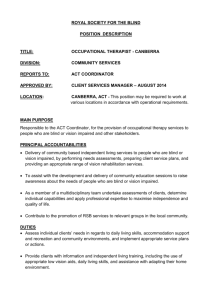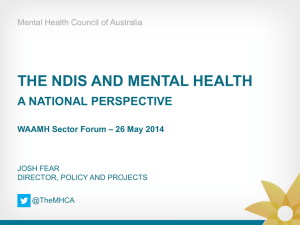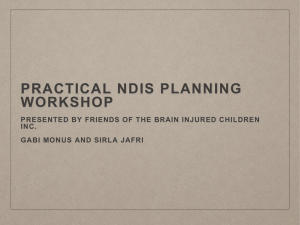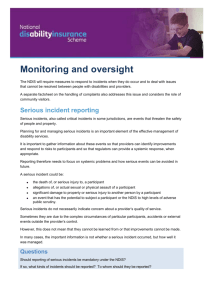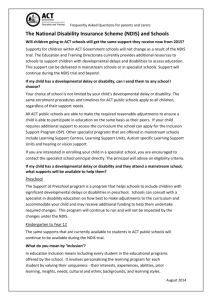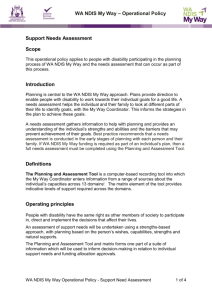RSB_-NDIS-Quality-and-Safeguarding_30.4.15.
advertisement
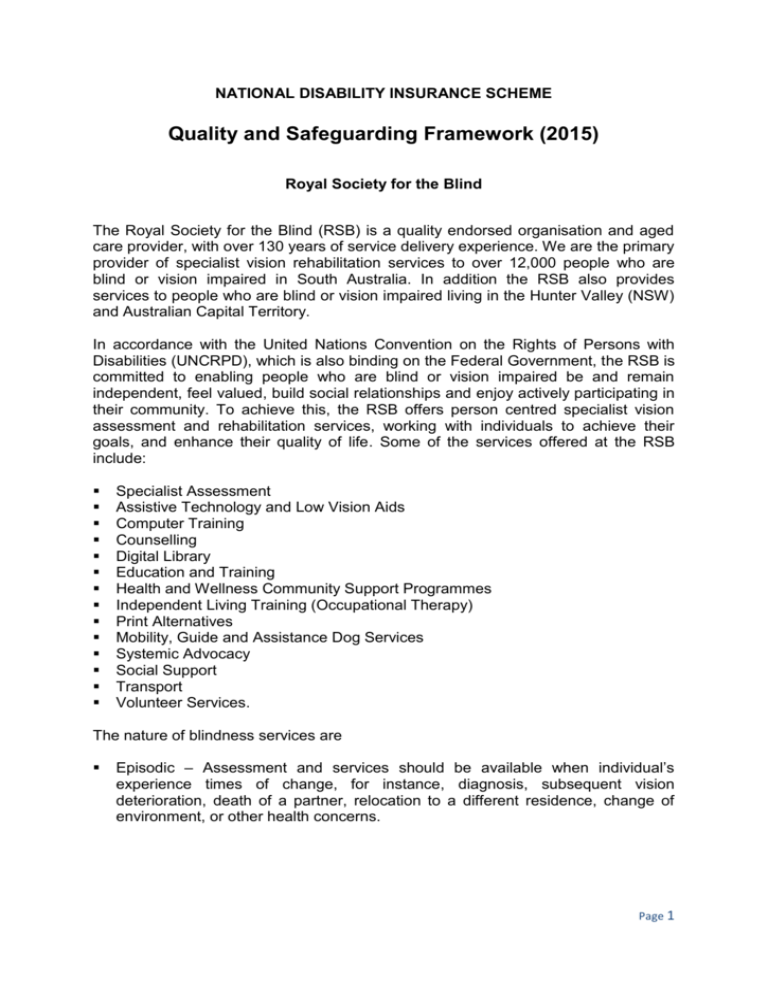
NATIONAL DISABILITY INSURANCE SCHEME Quality and Safeguarding Framework (2015) Royal Society for the Blind The Royal Society for the Blind (RSB) is a quality endorsed organisation and aged care provider, with over 130 years of service delivery experience. We are the primary provider of specialist vision rehabilitation services to over 12,000 people who are blind or vision impaired in South Australia. In addition the RSB also provides services to people who are blind or vision impaired living in the Hunter Valley (NSW) and Australian Capital Territory. In accordance with the United Nations Convention on the Rights of Persons with Disabilities (UNCRPD), which is also binding on the Federal Government, the RSB is committed to enabling people who are blind or vision impaired be and remain independent, feel valued, build social relationships and enjoy actively participating in their community. To achieve this, the RSB offers person centred specialist vision assessment and rehabilitation services, working with individuals to achieve their goals, and enhance their quality of life. Some of the services offered at the RSB include: Specialist Assessment Assistive Technology and Low Vision Aids Computer Training Counselling Digital Library Education and Training Health and Wellness Community Support Programmes Independent Living Training (Occupational Therapy) Print Alternatives Mobility, Guide and Assistance Dog Services Systemic Advocacy Social Support Transport Volunteer Services. The nature of blindness services are Episodic – Assessment and services should be available when individual’s experience times of change, for instance, diagnosis, subsequent vision deterioration, death of a partner, relocation to a different residence, change of environment, or other health concerns. Page 1 Short Term/Intensive Interventions – After specialist assessment, individual plans are provided and intensive education and training occurs (e.g., mobility training with a white cane). Early detection and intervention is vital to a person’s understanding of their vision condition and can quickly enable people to learn new ways of engaging in activities. Therefore early access to specialist vision rehabilitation services will prevent people with vision loss developing care need dependencies. Traditionally people of all ages, irrespective of their individual socio economic circumstances have enjoyed equal access to specialist vision rehabilitation services and assistive technology and magnification aids. The RSB is a provider operating in two reform environments – disability and aged care. Currently both are operating separately in their own spaces. Underlying disability and aged care sector reforms are common government objectives which include red tape reduction, streamlined reporting, market deregulation, sustainability and consumer choice and control. The RSB is a provider currently impacted by the changes to both sectors. Accordingly the RSB believes that there should be one system to meet government objectives, as well as facilitating ease of reporting for providers and the transfer of individuals from one system (i.e., disability) to another (i.e., aged care) The RSB recognises the need for new nationally consistent and streamlined quality and safeguard mechanisms in the NDIS. Currently there are nine different quality systems in Australian jurisdictions for disability service provision. The NDIS requires one quality system. The focus of this consultation paper is on those participants eligible for an individual support plan. The RSB acknowledges that quality and safeguards are required. However there will be many people who have disabilities that are not eligible for an individual support plan. Will these people also be covered by safeguards? What will be the safeguards for those who have disabilities but are forced to access specialist disability services subsidised through aged care? The RSB is concerned that the likelihood of these individuals being directed to specialist vision services from the Gateway will be very low, and that those who do access and experience services through the disability sector, will not be covered by the NDIS quality and safeguards they too deserve. In responding to the paper, the RSB would like to propose Principles for consideration by the NDIS for consideration: (1) The development of nationally consistent approaches in servicing all vulnerable people. Change is occurring to both disability and aged care. The RSB encourages that both sectors use the same structures and requirements regarding registration, complaints handling systems, staff vetting, and workforce planning and development. Page 2 (2) Participants can elect to forgo a generic NDIA assessment to have a specialist assessment with a specialist disability provider of their choice. True consumer choice and control entails the individual being able to determine where they want to be assessed. People who are blind or vision impaired need to have a specialised function vision assessment. The RSB believes that the NDIA gateway could adopt a screen where individuals can be directed straight to their specialist provider for a specialist assessment or have their assessment through NDIA planners. QUESTIONS – Part One Developmental Domain What are the most importance features of an NDIA information system for participants? Accessing information is often a barrier for people who are blind or vision impaired. It is therefore important that information is accessible to everyone in the format of choice. For people who are blind or vision impaired information must be available in audio, braille, large print and in e-text. People need different ways of obtaining information. Some prefer online or print, while others prefer face to face and telephone contact. This is particularly important for people from different culturally and linguistically diverse backgrounds and older people. Some people understand information better when provided to them using a face to face approach. Many like to ask questions or engage in a dialogue as a means to better understand the information provided. It is vital that all information is easily understandable using little jargon and acronyms. All information must be accurate, relevant, up-to-date and well maintained in all formats – printed, on-line, social media and stated information. For people who like to engage in interactive on-line or social media interfaces, there will need to be a balance between encouraging engagement whilst ensuring that individual privacy and confidentiality is maintained. How can the information system be designed to ensure accessibility? It is integral that all NDIS communication and information-based policies promote the inclusion of information so that it is accessible to everyone. Page 3 Web-based Information People who are blind or vision impaired must be able to access on-line information. The RSB recommends that the NDIS website and information must be fully accessible with World Wide Web Consortium’s (W3C) Web Accessibility Initiative (WIA) at the highest level, including apps and YouTube/video presentations with audio description. The RSB recommends: Standard and consistent layout: People using screen reading software to access your website will locate navigation and content more effectively if they are in standard places on the page and do not move around from page to page. Provide a link at the beginning of the page that moves directly to the content: Every time a page loads or reloads screen reading software will start reading from the top of the page. This also means that usually it will read out the page navigation each time. If you provide a skip to content link at the beginning of the page users can choose to bypass the navigation and jump straight to the content. Ensure the user can resize the text: Text should be given a scalable unit size rather than a fixed size. Users can then choose to resize the text with the built in browser functions. Graphical text should also be avoided where possible as it cannot be enlarged by the user. Apply Alt tags to all images: If you apply an Alt (Alternative) tag to an image it will be read out by screen reading software when a user navigates to that image on the page. If no alt tag is applied, the screen reading software will read out the image name which, often, will not explain the image to the user. Alt tags need to describe the image in the context of the page. Provide text equivalents for all media files: Any audio or video files should have links to text equivalents. PDF files either need to be created in an accessible way or a text equivalent should also be provided. Ensure your site uses appropriate structural mark-up: Heading tags should be used in a consistent and logical way. Users of screen reading software will be able to effectively navigate around your site if heading tags are appropriately used. Lists should also be tagged correctly. Ensure link text is meaningful and informative: Don’t create ‘click here’ or ‘Download’ links. Download links should also include information about the type of file and the size of the document to be downloaded. For example: Annual Report 2012 (text 19Kb). Page 4 Don’t use tables for layout purposes: Tables should only be used to display tabular data and should be marked up appropriately so they can be read properly by screen reading software. If you use forms, make sure they are marked up for screen reading software: All form objects need to be correctly labelled so that screen reading software users know where they are in the form and what information they need to be entering. Users also need to be able to access and fill out the whole form and submit it using only the keyboard. Printed Information Regarding printed information the RSB recommends the following: Use Sans Serif type fonts which do not ‘clutter’ the words – Arial or Univers are better choices than serif fonts such as Times New Roman. Maintain standard even spacing. Instead of highlighting, present headings in a bold, large font size. Avoid the use of shading, backgrounds and logos. Keep characters such as brackets, colons, semi colons, dashes and slashes to a minimum. Print in a clean crisp black print. Use non-reflective matt finished paper – white is the best colour. The use of all capital letters together should be avoided. Align all text to the left, right ragged, avoiding the use of indenting. Ensure sufficient mid-margin space between columns. Enlarge graphics where possible. Minimum 12 point font. Face to Face Communication Communication to people who are blind or vision impaired is very important and optimises interpretation and understanding of information conveyed. The RSB offers strategies on best practice: Introducing yourself as you enter the room and explain your role. Page 5 Advising the person when you leave the room. Asking a person who is vision impaired if they would like assistance, and if so what? Give clear and precise directions, e.g. the door is three steps to your left. A person with a vision impairment may prefer to be seated with their back to windows to avoid glare. What would be the benefits and risks of enabling participants to share information, for example, through online forums, consumer ratings of providers and other means? It is important that all people have the opportunities to communicate and engage, particularly through social media and on-line. On-Line Forums and Consumer Ratings The RSB agrees with the concept of participants being able to exchange information in on-line forums. Issues identified by the RSB with the consumer rating concept, like Trip Advisor, are: (1) An individual’s free reign to voice their personal negative perceptions and experiences publically, and (2) The opportunity for people to complain on a public forum. Consumer ratings and on-line platforms offer opportunities for businesses to be potentially tarnished. Many people could have positive experiences but offer no comment or rating. However, one or two people could have a negative experience, post comments or ratings which could then give a negative perception to others. Experiences are very subjective. In this changing landscape, the RSB is cautious of provider ratings. There is significant change still to come which may give rise to potential negative experiences or gaps in information transfer. Often these on-line forums are a mechanism for people to complain. It would be integral that prior to negative complaints being posted people are directed through internal (i.e., organisational) and/or external complaints/grievance processes. For example, a person may have had a negative experience with an organisation’s staff member. These actions could cloud the individual’s experience of the whole organisation. The organisation will then be rated against the experience with one person. The situation needs to be handled through internal complaints systems, not a public platform. Page 6 There will need to be strict monitoring of posted comments or ratings, and they should be on the site for a limited time. The RSB believes that if a consumer rating system is introduced for service providers, the NDIA will also need to be included. The NDIA will be providing direct customer service and planning, through Local Area Coordinators and Planners. If providers will be open for feedback through a public forum, then so too should the NDIA. Are there additional ways of building natural safeguards that the NDIS should be considering? The RSB encourages that training and mentoring is a function of the NDIA, both directly through the NDIA or indirectly through service providers. Training - NDIA The NDIS will mark a significant shift in disability service assessment and planning, sector support and funding. It is vital that all involved have opportunities to be informed and upskilled of these changes. There will be areas in which training should be provided directly from the NDIA, like self-managed participants being offered training in areas required to ensure compliance to legislation (e.g., staff recruitment and WHS) and empowerment/self-assertiveness. Training – Service Providers Specialist disability providers, like the RSB, have specialist knowledge and understanding, and are therefore best equipped to provide training in their specialist disability. For instance, the RSB staff understand eye health, the functional impacts of vision loss and strategies to assist with each vision condition. Specialist organisations could be funded to provide training to participants, their staff (i.e., selfmanaged) or family/friends and NDIA staff. Mentoring Mentoring and peer support are valuable contributions to the disability sector. The RSB believes that anyone who provides any training or mentoring must be vetted. It will also be important that all mentors are supervised in terms of interpersonal skills and quality of their mentoring. The Proposal for a National Disability Insurance Scheme Quality and Safeguarding framework provided no definition of mentoring or mentor. A mentor could involve one to one casual peer review, e.g., a person who is blind advising another in how to use an iPad, or can be more formalised and ongoing. Further clarification on the Department’s definition of this concept is required. Page 7 Mentoring programs will need to be monitored if used in non-controlled environments. Mentoring can occur on-line or one to one in the community, outside of a closed, supervised environment. NDIS participants will be potentially vulnerable and must be safeguarded in any mentoring situation. People vary in likes, values and opinions. Depending upon the type of mentoring programme mentors should be able to explain all options and solutions, and not present their own personal views and biases. Organisations will need to be funded to create and maintain appropriate mentoring programmes, and to supervise and evaluate them. Planners It is integral that planners have a sound knowledge of disability. It would be a valuable contribution to the education of Planners and Local Area Coordinators if specialist disability providers can be involved in training and imparting knowledge of specialist disabilities. Building Capacity of Family and Friends In the new environment family, friends or carers have numerous interfaces, first as a support to the participant, but they can also be staff of the participant (i.e., those who self-manage their package). It will be integral that to build capacity of family, friends and carers of participants, that they have access to training through service providers (to better understand their loved one’s disability) and NDIA (for staffing, and more broader, systematic knowledge of the NDIS). What can be done to support people with a limited number of family and friends? The RSB offers the following approaches: The NDIS to fund programmes to cover staffing over weekends and public holidays. Volunteering options – funding service providers to recruit, train and maintain volunteers to work on weekends. The NDIS to fund organisations to hold social support groups or programmes on weekends or evenings. A review of transport options – to encourage people with disabilities to get out and access mainstream community events. To create programmes and clubs to operate on weekends and evenings that are managed by people who have disabilities and who are socially isolated. Page 8 Page 9 Preventative Domain What kind of support would providers need to deliver high-quality supports? Workforce/ Staff Specialist services – high quality services can only be provided if specialist staff are offered training and upskilled as technology and knowledge improves. Quality equals high customer service plus a good understanding of an individual’s disability. The only way organisations can obtain, train and retain high calibre staff is with additional resources and funding. The NDIS must ensure that rates/fees include staff training & retention, and workforce development. The NDIS should also promote the sector to attract the best workers to the industry. Sector Support The RSB believes that a national sector development group (similar to the National Aged Care Alliance – NACA) should be created. This group would have representation from consumers, providers, disability peak bodies, NDIA & DSS policy areas. This collaboration would set sector objectives and policy direction. The Department could also use this group as an information hub and resource for sector feedback on key policy direction, as well as identify issues within the sector and gaps requiring Departmental involvement. Corrective Domain Should there be an independent oversight body for the NDIS? As disability and aged care are purporting concepts of individual support plans and consumer directed care, it seems appropriate that one structure covering both disability and aged care be created. For example in aged care there currently exists the Aged Care Commissioner that investigates complaints about the Aged Care Complaints Scheme (the Scheme) and Australian Aged Care Quality Agency (AACQA). There will need to be a mechanism to feed into the NDIS ensuring that policy can be challenged. The operation and function of the NDIS should be reviewed e.g., three yearly. All providers must have robust complaints handling policies and procedures. Page 10 What functions and powers should an oversight body have? The RSB believes that any oversight body should have equal function and powers to the complaints handling process in the aged care system. That is, people wanting to complain externally about a provider can seek assistance through the Scheme. For those wanting to complain about the Scheme or AACQA, a complaint can be lodged with the Aged Care Commissioner. The RSB believes that an oversight body should investigate complaints about the NDIA and providers. Participants need to feel comfortable to make a complaint and that their information is validated. This can come from having an external oversight body. QUESTIONS – Part Two The RSB encourages a system where people with disabilities can choose the services and providers that best meet their needs, whilst ensuring safe, ethical and quality practice. Keeping this mind, the RSB is also mindful that there will be a number of people who will access services from both the disability and aged care sector, i.e., they may start as a participant, but elect to move to the aged care sector. The RSB’s responses to Part Two, therefore, seek consistency between the disability and aged care sectors to reduce red tape and ensure quality and sound safeguards exist for both participants and organisations who are both disability and aged care providers. NDIA PROVIDER REGISTRATION Considering the options described above, which option would provide the best assurance for: Providers? Participants? Of the options presented in the paper the RSB prefers Option 4 for both providers and participants. Participants who are blind or vision impaired will include those living in the community independently through to people with multiple disabilities that require intense service involvement. Organisations that provide services to people in both the aged care and disability sectors must comply with disability and aged care requirements. The RSB believes Page 11 that both systems should have the same registration process in an effort to foster consistency and reduce confusion and expense for providers. Should the approach to registration depend on the nature of the service? The RSB understands that services vary in nature. An infrequent service that involves very little contact (e.g., lawn mowing) differs to those that involve frequent and intimate contact or exposure, and where a trusting rapport is required (e.g., personal care; assistance with banking and paying bills). Services that involve a dimension of trust could potentially leave a participant extremely vulnerable. The challenge is that people who have disabilities are vulnerable to exploitation. The NDIS however has a wide scope ranging from those who self-manage and have good capacity to those with limited capacity. A safe and appropriate balance is needed regarding registration. The RSB believes that it is integral that any provider of service to a participant at the very minimum is a member of an Industry Association and meets their requirements. They should also have professional indemnity insurance. How can the right balance be reached between providing assurance and letting people make their own choices? The NDIA have a duty of care to all participants. NDIA approved providers must all be safe, ethical and reliable. SYSTEMS FOR HANDLING COMPLAINTS How important is it to have an NDIS complaints system that is independent from providers of supports? All organisations should have thorough internal complaints handling systems, which is mandatory to comply with quality assurance registration. The RSB prefers option 3B. Similar to aged care, the disability sector should have a body separate to the NDIA who can investigate complaints. This would provide an avenue for both providers and participants to lodge complaints about the NDIA without fear of reprisal. Should an NDIS complaints system apply only to disability-related supports funded by the NDIS, to all funded supports, or to all disability services regardless of whether they are funded by the NDIS? The NDIS complaints system should only apply to NDIS funded services. Page 12 What powers should a complaints body have? To investigate and arbitrate the complaint. Should there be community visitor schemes in the NDIS, and what should their role be? A community visitor scheme would be advantageous for those who have little family support or social networks. The RSB encourages high level vetting and supervision of any community volunteer. ENSURING STAFF ARE SAFE TO WORK WITH PARTICIPANTS Who should make the decision about whether employees are safe to work with people with disability? For people who are self-managed the participant chooses their own staff. Therefore they must adhere to risk management principles. Allied health/therapeutic professionals should be screened and checked through an approved provider and adhere to professional registration requirements. The system (i.e., NDIS) should define the protocols and overarching framework of defining minimum employee requirements from which the participant can choose. Risk is with the employer as well as costs associated with compliance. How much information about a person’s history is required to ensure they are safe to work with people with disability? The RSB believe that offences vary in degree, posing different potential harm to vulnerable individuals. This will influence how much history of a person is required. All people who have disabilities are vulnerable, and therefore require a minimum set of safeguards. For those employed their employer should have internal recruitment processes and internal policies that investigate safety to work with vulnerable people. However these processes do not exist for people who are self-employed, which is a high risk and requires further work. Page 13 Of the options described above, which option, or combination of options, do you prefer? The RSB believes that option 3 is the best, and option 2 is a minimum. In South Australia providers have similar requirements to Option 3: Working with vulnerable people clearances. At this point in time the RSB must obtain a Crim Check for all staff and various Clearances through the Department of Communities and Social Inclusion (DCSI) depending upon the position being recruited. However for one staff member the RSB could be required to obtain Child Related Employment screen, Aged Care Sector Employment screen and Disability screen. All DCSI screens must be done manually (in triplicate) and be posted. They are time consuming to complete and lodge, and can be lengthy delays in waiting their outcomes (which adds financial and operational costs for business). Accordingly the RSB would like a standardised system that is electronic, simple, cost effective with a quick turnaround. SAFEGUARDS FOR PARTICIPANTS WHO MANAGE THEIR OWN PLANS Should people who manage their own plans be able to choose unregistered providers of supports on an ‘at your own risk’ basis (Option 1) or does the NDIS have a duty of care to ensure that all providers are safe and competent? The NDIA as a funder has a duty of care that all participants are safeguarded. The NDIA also have a duty of care to ensure that the individual has capacity to make decisions in understanding the risk in engaging contractors. The RSB suggests that all participants wanting to manage their own plans are required to undergo training in risk management and staff related practices. The NDIA also has a further duty of care to ensure that families who manage a participant’s package are ethical and that it is safe to do so. What kind of assistance would be most valuable for people wanting to manage their own supports? The RSB suggests that training in the following topics would be beneficial for people managing their own supports: Budgeting/Basic Book Keeping. WHS (e.g., Manual Handling/ Bullying and Harassment/ Safe Food Handling). Time management. Page 14 Understanding of recruitment processes. Contracting – Legal requirements and safeguards. Personal Development and Assertiveness; Self Advocacy. Privacy and Confidentiality. The RSB acknowledges that the NDIA has some resources on their website for selfmanaging participants, although not available in all languages. The RSB encourages that self-managing participants should be able to access training through different formats i.e., on line, fact sheets, webinars or face to face. REDUCING AND ELIMINATING RESTRICTIVE PRACTICES IN NDIS FUNDED SUPPORTS The RSB does not engage in restrictive practices and therefore has no comment. In conclusion the RSB believes that there should be: One quality assurance system across disability and aged care. The NDIA should provide adequate training and capacity to individuals who selffund. All providers must have full quality assurance accreditation upon registration, and The NDIS should only be an assessment and referral agency, not service provider or system auditor. If you would like any further information please contact the undersigned. Andrew Daly Executive Director The Royal Society for the Blind andrew.daly@rsb.org.au (08) 4175599 Page 15
